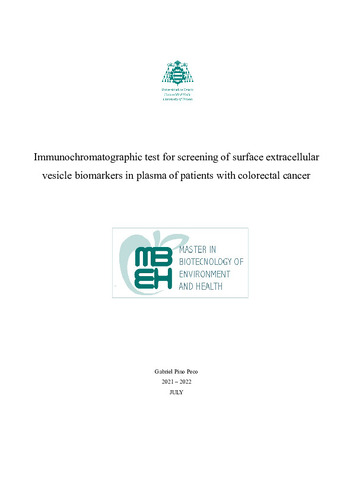Prueba inmunocromatográfica para el cribado de biomarcadores superficiales de vesículas extracelulares en plasma de pacientes con cáncer colorrectal
Autor(es) y otros:
Director(es):
Fecha de publicación:
Serie:
Máster Universitario en Biotecnología del Medio Ambiente y la Salud
Descripción física:
Resumen:
Colorectal cancer is one of the most frequent malignant neoplasms in the world, as well as one of the leading causes of cancer death. Affecting mostly developed countries, this cancer can be treated with a high success chance if it is detected at an early stage. However, current diagnosis methods are either non-specific or invasive and uncomfortable for patients. Thus, they are not the most suitable strategies for extensive screening of the population. Our team has been working on a detection method offering a fast, easy-to-use and non-invasive diagnosis, in the form of a lateral flow immunoassay for the measurement of surface markers in extracellular vesicles. Previously considered as cellular waste products, extracellular vesicles are now known to be involved in cell-to-cell communication, inflammation and immune response regulation. Research has also proven that extracellular vesicle composition and release are altered in tumor cells, which makes them potential biomarkers for cancer diagnosis. The present work focused on the analysis of plasma-derived extracellular vesicles containing membrane proteins CD9, CD147 and EpCAM, from samples of patients at different stages: control, low-grade adenoma, high-grade adenoma and colorectal cancer. Our aim is to understand the potential of our lateral flow immunoassay as a point-of-care device using the extracellular vesicle markers CD9, CD147 and EpCAM for the diagnosis of colorectal cancer at different clinical stages.
Colorectal cancer is one of the most frequent malignant neoplasms in the world, as well as one of the leading causes of cancer death. Affecting mostly developed countries, this cancer can be treated with a high success chance if it is detected at an early stage. However, current diagnosis methods are either non-specific or invasive and uncomfortable for patients. Thus, they are not the most suitable strategies for extensive screening of the population. Our team has been working on a detection method offering a fast, easy-to-use and non-invasive diagnosis, in the form of a lateral flow immunoassay for the measurement of surface markers in extracellular vesicles. Previously considered as cellular waste products, extracellular vesicles are now known to be involved in cell-to-cell communication, inflammation and immune response regulation. Research has also proven that extracellular vesicle composition and release are altered in tumor cells, which makes them potential biomarkers for cancer diagnosis. The present work focused on the analysis of plasma-derived extracellular vesicles containing membrane proteins CD9, CD147 and EpCAM, from samples of patients at different stages: control, low-grade adenoma, high-grade adenoma and colorectal cancer. Our aim is to understand the potential of our lateral flow immunoassay as a point-of-care device using the extracellular vesicle markers CD9, CD147 and EpCAM for the diagnosis of colorectal cancer at different clinical stages.
Colecciones
- Trabajos Fin de Máster [5292]
Ficheros en el ítem





